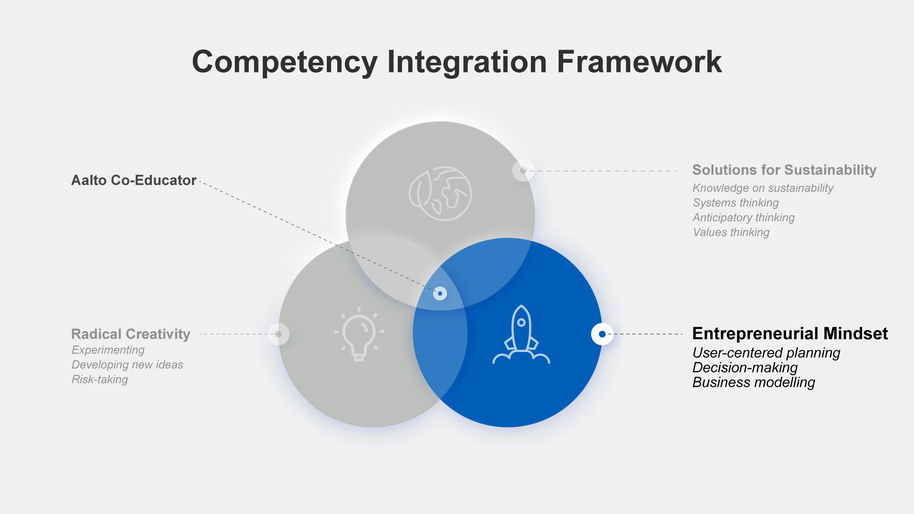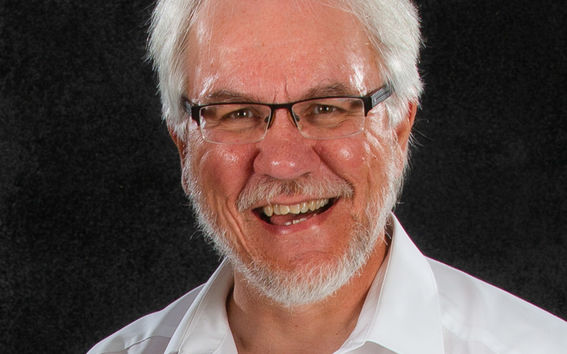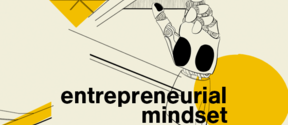The Aalto Co-Educators
All Aalto graduates should have the capability to analyse and tackle complex sustainability challenges especially related to their own field, and to grasp opportunities for making a change.

Shaping a sustainable future calls for taking action and finding solutions to foster change.
Any student at Aalto University can develop an entrepreneurial mindset, they do not need to be an entrepreneur to do so.
Jouko Lampinen, Dean of the School of Science on what it means to have an entrepreneurial mindset: "The entrepreneurial mindset is about the ability and willingness to continuously search for opportunities to create sustainable social and economic value and the courage to take action to pursue these opportunities under uncertainty. […] Having an entrepreneurial mindset doesn’t mean one embarks on a journey to become an entrepreneur; it means applying this mindset to whatever it is you strive towards with unmatched passion."
Having an entrepreneurial mindset means being able to adapt to change, identifying problems that need solving and innovating for solutions. It encourages staying motivated and moving forward even when the world is constantly changing. Competencies from Radical Creativity like risk-taking and experimenting complement having an entrepreneurial mindset. Lauri Järvilehto, Professor of Practice, School of Science, in this piece reflects on the entrepreneurial mindset as a way of thinking: "For one equipped with the entrepreneurial mindset, the pace of change will increase the number of opportunities for problem-solving. A changing world becomes not only possible to navigate and adapt to, but it also becomes an opportunity to push the change further to make the world a better place for everyone."
But what does it mean to teach an 'entrepreneurial mindset'?
The Aalto Co-Educator team drafted the competencies of an entrepreneurial mindset to be user-centred planning, decision-making and business modelling (shown in figure 1 below) as part of their competency integration framework. Any student could find it meaningful to build on these three entrepreneurship competencies, especially when working towards innovating solutions for an identified problem and potentially setting up a business for it to make a greater impact.


Håkan Mitts, entrepreneurial mindset expert in Aalto Co-Educator, provides an example of how entrepreneurship competencies could be integrated in teaching: "Learning outcomes should be integrated into teaching in a way that they are meaningful to the students and the other content being taught. Take for example an engineering course that focuses on early-stage research and development (R&D). Integrating a learning outcome like 'financial calculations' into the early stages of R&D does not necessarily make sense because there is no business or production yet. But a learning outcome like 'user-centred planning' will be more meaningful to the students at that point because it complements the phase of the development process being taught."
Building on Håkan Mitts' example above, researching and developing interventions for an identified complex global problem has an integral starting point which is identifying user and customer needs (user-centered planning). This is key in making products or services that would be valuable to the user. If the developed intervention proves to have a growing user base and can make a great impact by pushing for change, setting up a business would be a potential next step. This is where business modelling comes in, with the ability to search for and define business models that provide economical, social and environmental sustainability. Decision-making is important for any student to move forward on their path towards shaping a sustainable future, and it means being able to systematically collect and analyse data and use that to propose the next actions.
The competencies acquired under the 'label' of entrepreneurship also support the student in undertaking other types of endeavours, be it voluntary work, intrapreneurship inside companies, etc. They are important for students' personal learning in addition to changing the economy and/or the world. Knowing more about how these competencies can be meaningful to students from any field of study helps with identifying the relevant competencies and how they can be integrated into courses or curricula.
If you would like to know more about integrating entrepreneurship competencies into your course or programme curriculum, contact the Aalto Co-Educator team at co-educators@aalto.fi. We would love to collaborate with you!

All Aalto graduates should have the capability to analyse and tackle complex sustainability challenges especially related to their own field, and to grasp opportunities for making a change.

We advance the entrepreneurial mindset and capabilities of our community.


